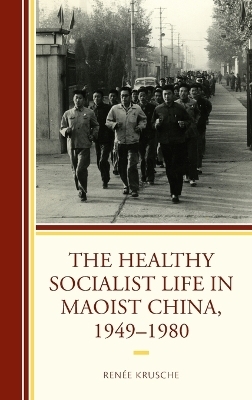
The Healthy Socialist Life in Maoist China, 1949–1980
Seiten
2022
Lexington Books (Verlag)
978-1-7936-5455-7 (ISBN)
Lexington Books (Verlag)
978-1-7936-5455-7 (ISBN)
This book examines Mao-era health practices that were implemented to foster individual health and national production goals in socialist China. It highlights continuous state efforts towards a national healthy body and setbacks in the form of diseases of civilization.
This book observes the growing importance of individual well-being for collective health in socialist China and the limitations this brought on the authorities. Engaging with contemporary popular media discourse—including handbooks and magazine articles on health and health practices—to demonstrate how biomedical knowledge was ingrained in the readership, this book uncovers the detailed path to health propagated by state media for the Chinese population. This authority-sanctioned discussion opened up a space for talking about a body entwined with production and the personal experience of daily life.
Nutrition, exercise, and rest were the main fields in which the party–
state encouraged and accommodated healthy behavior to foster a strong population in the wake of the building of the "New China." These three case studies highlight the network of social groups, institutions, and experts involved in the production and implementation of health knowledge as well as the continuity of health discourse itself. Through a thorough exploration of these three pillars of health and the emerging debate on civilization diseases, this book unearths the often-ignored limits of state control over human bodies.
This book observes the growing importance of individual well-being for collective health in socialist China and the limitations this brought on the authorities. Engaging with contemporary popular media discourse—including handbooks and magazine articles on health and health practices—to demonstrate how biomedical knowledge was ingrained in the readership, this book uncovers the detailed path to health propagated by state media for the Chinese population. This authority-sanctioned discussion opened up a space for talking about a body entwined with production and the personal experience of daily life.
Nutrition, exercise, and rest were the main fields in which the party–
state encouraged and accommodated healthy behavior to foster a strong population in the wake of the building of the "New China." These three case studies highlight the network of social groups, institutions, and experts involved in the production and implementation of health knowledge as well as the continuity of health discourse itself. Through a thorough exploration of these three pillars of health and the emerging debate on civilization diseases, this book unearths the often-ignored limits of state control over human bodies.
Renée Krusche is postdoctoral research fellow and lecturer at University of Erlangen–Nuremberg.
Part I: Nutritional Government
Chapter 1 Shapes of Nutrition
Chapter 2 Spaces of Food
Part II: Physical Government
Chapter 3 Plans for the Body
Chapter 4 Time to Rest
Part III: Disease Government
Chapter 5 Overweight and Obesity
Chapter 6 Hypertension
| Erscheinungsdatum | 06.10.2022 |
|---|---|
| Verlagsort | Lanham, MD |
| Sprache | englisch |
| Maße | 159 x 239 mm |
| Gewicht | 531 g |
| Themenwelt | Geisteswissenschaften ► Geschichte ► Regional- / Ländergeschichte |
| ISBN-10 | 1-7936-5455-7 / 1793654557 |
| ISBN-13 | 978-1-7936-5455-7 / 9781793654557 |
| Zustand | Neuware |
| Haben Sie eine Frage zum Produkt? |
Mehr entdecken
aus dem Bereich
aus dem Bereich
Universalgelehrter, Polarreisender, Entdecker
Buch | Hardcover (2024)
mareverlag
CHF 39,20


